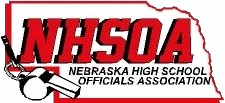The single most effective way to avoid problems is to know the rules. If an official has not studied all of the printed materials, as well as any other efforts to improve upon his or her knowledge, mechanics, etc., that official has not done everything possible to avoid problems.
Additional ways to eliminate potential problems:
1. Never run down other officials. They will receive enough criticism without getting it from their colleagues. This includes officials you may view as a spectator. Offer only positive criticism, if requested. You may very well be considered an expert, especially by someone trying to find fault in the officials.
2. Establish a firm but polite relationship with coaches. Trying to be overly friendly will get you in just as much trouble as being too gruff.
3. Be on time! The official who arrives late, or even at the very last minute, is probably not mentally prepared and probably raises questions in the minds of the coaches about his or her sincerity and dedication. Be certain to have enough time to talk to the timers, scorer, chain crew, etc.
4. Either alone, or with your partner(s) (if you are working with other officials) prepare yourself psychologically. You must "get up" for the contest. Review basic rules, mechanics and procedures.
5. Don't talk to the fans. This only encourages them to talk to you and you may very well wish you had not encouraged them. Try not to have "rabbit ears." Even if you do hear comments made by fans, you must learn to ignore them and not let them influence you.
6. Inspect the field, court, mat, etc. If you can detect problems with the facilities before the contest begins, you can make adjustments and notify coaches and players of them.
7. Review procedures with captains. Be certain to ask them if they have any questions.
8. Support the decisions made by your fellow officials. To disagree or overrule the decision made, can only indicate to the athletes, coaches and fans that one of you made a mistake. If, however, an error is made by you or your partner in rule application, you should admit it and make the necessary correction. The only thing worse than making a correctable mistake is not correcting it.
9. Maintain poise or emotional control. You may be the only one around who is remaining "cool." If you get emotional, the situation can only get worse.
10. Be clear and concise with signals. If players, fans and coaches don't understand what is going on and why a penalty was called or what the penalty was, you raise doubts in their minds as to whether or not it was right.
11. Use common sense. Any number of situations may occur during any contest where the officials must use common sense. Under certain circumstances, you may be asking for more trouble than it is worth to enforce a very technical and almost insignificant rule.
Additional ways to eliminate potential problems:
1. Never run down other officials. They will receive enough criticism without getting it from their colleagues. This includes officials you may view as a spectator. Offer only positive criticism, if requested. You may very well be considered an expert, especially by someone trying to find fault in the officials.
2. Establish a firm but polite relationship with coaches. Trying to be overly friendly will get you in just as much trouble as being too gruff.
3. Be on time! The official who arrives late, or even at the very last minute, is probably not mentally prepared and probably raises questions in the minds of the coaches about his or her sincerity and dedication. Be certain to have enough time to talk to the timers, scorer, chain crew, etc.
4. Either alone, or with your partner(s) (if you are working with other officials) prepare yourself psychologically. You must "get up" for the contest. Review basic rules, mechanics and procedures.
5. Don't talk to the fans. This only encourages them to talk to you and you may very well wish you had not encouraged them. Try not to have "rabbit ears." Even if you do hear comments made by fans, you must learn to ignore them and not let them influence you.
6. Inspect the field, court, mat, etc. If you can detect problems with the facilities before the contest begins, you can make adjustments and notify coaches and players of them.
7. Review procedures with captains. Be certain to ask them if they have any questions.
8. Support the decisions made by your fellow officials. To disagree or overrule the decision made, can only indicate to the athletes, coaches and fans that one of you made a mistake. If, however, an error is made by you or your partner in rule application, you should admit it and make the necessary correction. The only thing worse than making a correctable mistake is not correcting it.
9. Maintain poise or emotional control. You may be the only one around who is remaining "cool." If you get emotional, the situation can only get worse.
10. Be clear and concise with signals. If players, fans and coaches don't understand what is going on and why a penalty was called or what the penalty was, you raise doubts in their minds as to whether or not it was right.
11. Use common sense. Any number of situations may occur during any contest where the officials must use common sense. Under certain circumstances, you may be asking for more trouble than it is worth to enforce a very technical and almost insignificant rule.

 RSS Feed
RSS Feed